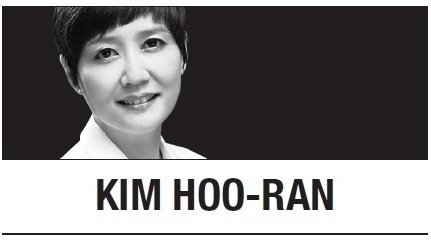“What’s in a name? That which we call a rose/ By any other name would smell as sweet.” So spoke Juliet Capulet to Romeo Montague in Shakespearean tragedy “Romeo and Juliet.”
But, of course, there is a lot in a name. It is by which you are called your whole life, it is your identity.
In Korea, where names take on a great significance, a lot of thought and care are taken in naming a new born. Often, one character of the two-character name is used by everyone in a certain lineage, tying you to a long line of your ancestors. Sometimes, you will meet someone who is a distant relative, the two of you immediately recognizing your familial ties because you share the same character in your names.
Sometimes, a name-maker -- well-known name-makers command premium fees -- is consulted in coming up with a newborn’s name. The birth hour and birth date are among the myriad factors taken into consideration in coming up with an auspicious name. An auspicious name would ensure that the infant has a good, prosperous and long life, according to the believers of this practice.
Sometimes, it is the paternal grandfather who has the honor of bestowing a new child’s name, taking into consideration how it sounds and, more importantly, what it means.
At a dinner many years ago, the table, which included a rabbi, fell into a conversation about names. We shared how different cultures named their children. Some last names can be traced to the ancestors’ vocations, others indicate where the family hails from. Some religious traditions name the children after Biblical figures to whom, it is hoped, the children would look up to as models, someone whose lives they would try to emulate. “We, all of us, should live up to our names,” the old rabbi said.
Korean actor Youn Yuh-jung began her Oscar acceptance speech last month by acknowledging the presenter, actor Brad Pitt, for correctly pronouncing her name. The quick witted actor known for her sharp tongue then went onto say, “As you know I’m from Korea, and actually my name is Yuh-jung Youn and most European people call me Yuh-yung, and some of them call me You-jung. But tonight, you are all forgiven,” I thought, “Well done!”
You see, I have too often heard so-called “unusual,” “difficult,” “foreign” names being badly mispronounced. Sometimes the speaker would mumble the name apologetically or try to glide over it.
I have had a fair share of my name being mispronounced by both Koreans and non-Korean speakers. Because it is not a common Korean name, my compatriots often have a difficult time getting the first letter of my name right. They appear to mishear it because it is an unexpected character. Then there are the non-Korean speakers who are misled into reading my name as “Who Ran.” But that is understandable. Without any knowledge of the sound of Korean language or the Korean Romanization system, such mishaps are bound to occur.
But it is when these mispronunciations can be averted but nevertheless do occur that I am irked and, sometimes, even angry.
A case in point. I was at an event a few years ago where the then US ambassador was giving a speech. He began by acknowledging senior Korean officials who were present that night.
However, he mangled their names so badly, I could not make out the people whose names were being said. Such “Americanization” of Korean names by the top US diplomat in the country who, by this time, had been in Korea for a number of years, was disappointing to say the least. It showed disrespect for the culture of the host country and was disrespectful to the people he was naming.
It was in stark contrast to his predecessor, who, by the end of his tenure in Seoul, was giving speeches in Korean. Needless to say he was very popular among Koreans.
There is no excuse for mispronouncing names. If you are emceeing, moderating or hosting an event, you can prepare yourself by learning the correct pronunciation and practicing it. You can even Google for the correct pronunciation. If you are introduced to someone with an unfamiliar name, ask the person for the correct pronunciation and repeat it until you get it right. The other person will appreciate your efforts.
There is a lot to a name and getting the name right is essential to acknowledging the person.
By Kim Hoo-ran (
khooran@heraldcorp.com)
Kim Hoo-ran is the culture desk editor at The Korea Herald. – Ed.








![[Today’s K-pop] Blackpink’s Jennie, Lisa invited to Coachella as solo acts](http://res.heraldm.com/phpwas/restmb_idxmake.php?idx=644&simg=/content/image/2024/11/21/20241121050099_0.jpg)